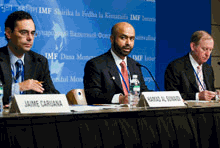
Typical street scene in Santa Ana, El Salvador. (Photo: iStock)
IMF Survey: Wealth Funds Group Publishes 24-Point Voluntary Principles
October 15, 2008
- Santiago Principles aim for transparent, sound wealth funds governance
- Sovereign funds' long-term horizons can promote stability in financial markets
- Work on permanent international wealth funds body to start in early 2009
The International Working Group of Sovereign Wealth Funds (IWG) published a set of 24 voluntary principles designed to ensure an open international investment environment.

Over half of sovereign wealth fund assets are in hands of countries that export significant amounts of crude oil, natural gas (photo: Ron Watts/Corbis)
SOVEREIGN WEALTH FUNDS
The IWG, representing countries with sovereign wealth funds, presented the Santiago Principles—agreed in the Chilean capital last month—to the IMF's policy-setting body, the International Monetary and Financial Committee, and posted the principles on the IWG website. The IWG also started examining the creation of a permanent international body to represent sovereign wealth funds.
The IWG was set up to produce principles that properly reflect the governance and investment practices of SWFs. The group was co-chaired by Hamad Al Suwaidi, Undersecretary of Abu Dhabi's Finance Department and Jaime Caruana, Director of the IMF's Monetary and Capital Markets Department. IMF staff facilitated and coordinated the work and provided technical support to the IWG.
SWFs are defined as special purpose investment funds or arrangements, owned by the general government. Created by the general government for macroeconomic purposes, SWFs hold, manage, or administer assets to achieve financial objectives, and employ a set of investment strategies that include investing in foreign financial assets. The SWFs are commonly established out of balance of payments surpluses, official foreign currency operations, the proceeds of privatizations, fiscal surpluses, and/or receipts from commodity exports.
SWFs have operated at least since the 1950s and have become increasingly important players in the international monetary and financial system. Recently the rapid accumulation of foreign currency assets and fiscal surluses in some countries has resulted in an increase in the size, and in a growing number, of SWFs.
IWG member countries
Australia, Azerbaijan, Bahrain, Botswana, Canada, Chile, China, Equatorial Guinea, Iran, Ireland, South Korea, Kuwait, Libya, Mexico, New Zealand, Norway, Qatar, Russia, Singapore, Timor-Leste, Trinidad and Tobago, United Arab Emirates, United States
IWG permanent observers
Oman, Saudi Arabia, Vietnam, Organization for Economic Cooperation and Development, World Bank
As a result, the total assets of SWFs worldwide have grown dramatically over the past 10-15 years, and various market estimates suggest that their assets may rise further from $2-3 trillion today to about $6-10 trillion within five years. At present, China, Kuwait, Norway, Russia, Singapore, and the United Arab Emirates are among the countries with the world's largest SWFs. SWFs also exist in several middle-income countries, including Botswana and Trinidad and Tobago.
Free flow of capital, investment
IWG co-Chair Hamad al Suwaidi told an October 11 news conference in Washington that "through the implementation of the Santiago Principles, we seek to ensure that the international investment environment will remain open."
An IWG statement said the purpose of the Santiago Principles was to
• Establish a transparent and sound governance structure that provides for adequate operational controls, risk management and accountability
• Ensure compliance with applicable regulatory and disclosure requirements in the countries in which SWFs invest
• Ensure SWFs invest on the basis of economic and financial risk and return-related considerations, and
• Help maintain a stable global financial system and free flow of capital and investment.
"We believe that this document will in both home and recipient countries improve the understanding of the objectives, structures, and governance arrangements of SWFs; enhance the understanding of SWFs as economically and financially oriented entities; and help maintain an open and stable investment climate," Al Suwaidi said.
Public disclosures
Al Suwaidi also noted that the Santiago Principles contain "provisions confirming the IWG's expectations that recipient countries will not subject the SWFs to discriminatory measures to which other foreign or domestic investors in similar circumstances are not subjected. We trust the recipient countries will support these provisions."
"We had to establish trust in recipient countries that the activities of SWFs are all based on an economic and financial orientation," said IWG drafting Chair David Murray. "Our task was to convince the world of our commitment to openness."

IWG co-Chair Jaime Caruana ( l ), drafting Chair David Murray ( r ) at news conference with co-Chair Hamad Al Suwaidi: "It's all about trust" (IMF photo)
SWFs are open to being more transparent, Al Suwaidi told the news conference, noting that the Santiago Principles specifically commit wealth funds to make a series of public disclosures. But SWFs must not be put at a competitive disadvantage in the marketplace, he stated. Development and publication of the Santiago Principles was "all about trust."
Ministerial meeting
The IMF hosted a ministerial meeting October 11 of countries with SWFs and of recipients of SWF flows, attended by representatives of the Organization for Economic Cooperation and Development (OECD)—which has developed guidance for SWF recipient countries—and of the European Union.
OECD Secretary General Angel Gurría told the ministerial meeting the elaboration of the Santiago Principles by the IWG was essential to preserve freedom of investment and global prosperity. "The OECD is very pleased to have been invited to observe this work and to provide inputs" to the principles, he said.
Taken together, OECD guidance to recipient countries and the Santiago Principles "provide the international community with a robust framework for promoting mutual trust and confidence and reaping the full benefits of SWFs for home and host countries. As countries face major financial turbulence, it is all the more important to keep capital inflows moving freely," Gurría stated.
Turbulent times
Joaquin Almunia, European Commissioner for Economic and Monetary Affairs, said at the ministerial meeting that the Santiago Principles amount to a global public good that can help foster trust and confidence between sovereign wealth funds, their originating countries, and the recipient countries. "This is what we need in these turbulent times: a strong commitment to enhance mutual trust and maintain and preserve an open investment environment."
Caruana told the news conference that the Santiago Principles are more important today because of the global financial crisis. "The fact that we have investors who can take decisions with long-term horizons is an element that can contribute to financial stability. That's exactly the role that SWFs can play, because they have this kind of long-term view."
Murray said consideration of a permanent international sovereign wealth funds body would commence in early 2009. Such a body could help SWFs to build capacity and work together, and also to adapt the Santiago Principles as necessary. The permanent structure would also conduct outreach to help the world better understand SWFs.
Comments on this article should be sent to imfsurvey@imf.org


